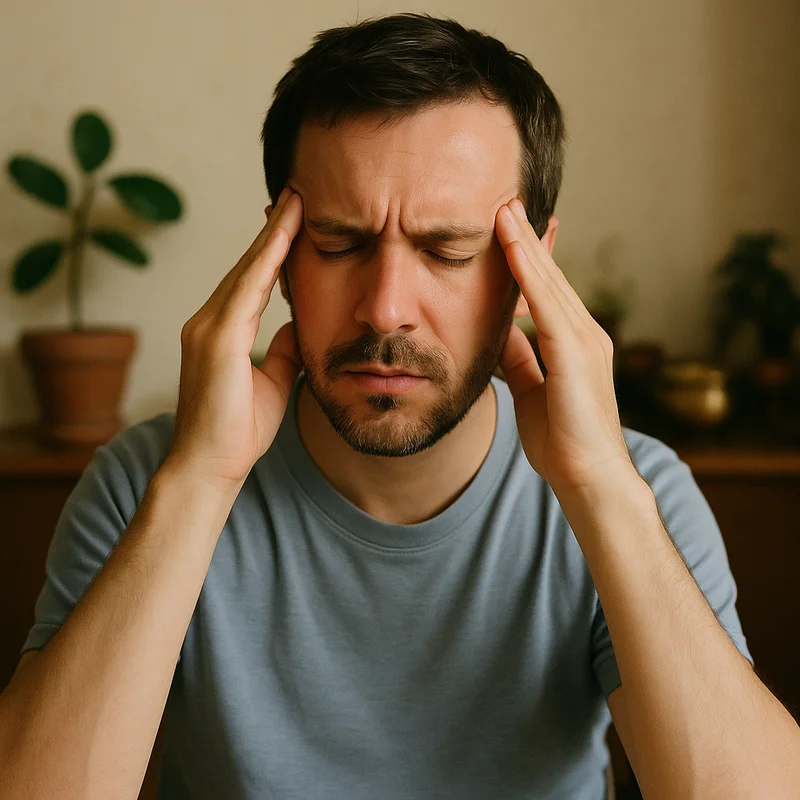Ask Ayurvedic doctor a question and get a consultation online on the problem of your concern in a free or paid mode. More than 2,000 experienced doctors work and wait for your questions on our site and help users to solve their health problems every day.
What Causes Vertigo: Ayurvedic Perspective on Imbalance and Healing

Ever stood up too fast and felt like the world was tipping over? That strange, dizzying spin — like your brain suddenly got disconnected from your body? Yeah, that’s vertigo. And if you’ve felt it more than once, or for longer than a few seconds, you know it’s not just annoying — it can be downright frightening. You start wondering what causes vertigo in the first place. Is it your neck? Your ears? Your mind playing tricks?
From an Ayurvedic standpoint, vertigo isn’t just a random nerve misfire. It’s your body waving a flag — saying something’s off-balance. It’s not just about spinning rooms or wobbly legs. It’s about deeper imbalances — in energy, in digestion, in how your nervous system interacts with the world. And once you see it like that, the path to healing starts to feel more grounded and holistic.
Let’s slow things down and look at how Ayurveda explains vertigo — and what we can actually do about it.

What Is Vertigo in Ayurveda?
In modern terms, vertigo is that spinning, floating, or swaying feeling you get when your balance system — mainly your inner ear and brain — is out of sync. But vertigo meaning shifts when we step into the Ayurvedic lens.
Ayurveda sees vertigo as a Vata or Pitta imbalance — a disturbance in the elements of air and fire. Vata governs movement, nerves, and all communication between brain and body. Pitta deals with heat, metabolism, and sharpness. When either of these doshas (energies) goes haywire — often due to stress, poor sleep, junk food, or mental overdrive — it can trigger what we experience as vertigo symptoms.
The name for vertigo in Ayurveda? Often called Bhrama, which literally translates to confusion, giddiness, or illusion — not just physically, but emotionally too. It’s as much about feeling unsteady in life as it is about losing your physical balance.
Don't wait or self medicate. Start chat with Doctor NOW
What Causes Vertigo According to Ayurveda
It’s not just about asking “what causes vertigo” — it’s about understanding how your whole lifestyle and energetic patterns contribute to that internal disorientation. Let’s dig into a few causes from the Ayurvedic view.
Mental and Nervous System Aggravation
Ever had a panic attack that left you dizzy? Or worked a 14-hour screen-filled day, only to collapse into bed feeling like your brain’s still spinning? That’s Vata overload. Too much sensory input, worry, lack of routine — all of it agitates the nervous system and sets the stage for imbalance.
In Ayurveda, this is prime territory for vertigo to sneak in. It’s not “all in your head” — but your head is definitely involved.
Cervical Vertigo and Postural Triggers
Here’s a tricky one: cervical vertigo. It happens when stiffness, tension, or misalignment in the neck messes with the nerves and blood flow to your head. Ayurveda would call this Vata stagnation — blocked movement of energy in the neck region.
Posture plays a massive role here. Sitting with your head forward, driving for hours, craning over phones — all these strain the neck and disturb the natural flow of prana (life force), leading to those swirling, unsteady episodes.
Causes of Vertigo in Women: Hormonal and Emotional Links
Okay, so here’s something not everyone talks about enough. Causes of vertigo in women can be deeply tied to hormonal shifts — think menstruation, menopause, or even pregnancy. Ayurveda sees this as a delicate dance of Pitta and Vata, both of which get stirred during hormonal fluctuations.
Add to that emotional stress, caretaking burnout, or sudden life changes, and you’ve got the perfect storm. Not surprising that women report vertigo more frequently — especially during transitions.

Symptoms and Early Signs of Vertigo
Let’s be honest — most people don’t recognize the early signs of vertigo until things get pretty dramatic. Like, the room’s spinning, you’re gripping the edge of a table, or you’re flat on the floor wondering if you're having a stroke. But here’s the thing: vertigo symptoms can be super subtle at first.
You might feel a momentary lightheadedness when standing up, a weird pressure in your ears, or even a brief “floating” sensation as you lie down. Some folks say it feels like walking on a boat — like their body is just a second behind the rest of the world. Others describe a foggy head, blurry vision, or a strange disconnect from their surroundings.
Ayurveda pays very close attention to these small signals — because they point to the body trying to rebalance. That lightheaded moment after skipping a meal? Vata talking. That heat rising to your head after an argument? Classic Pitta.
So, catching those early signs can actually be the best thing you do. It’s your cue to slow down, ground yourself, and start realigning your habits before vertigo hits full force.

Ayurvedic Treatment and Lifestyle Remedies for Vertigo
Here’s where things get interesting — and hopeful. In Ayurveda, treatment isn’t just about silencing symptoms. It’s about listening to them. Your dizziness isn’t the problem. It’s the body’s way of saying, “Hey, we’re off track. Let’s reset.”
There are several time-tested Ayurvedic approaches for vertigo treatment — from herbs and oils to daily routines that calm the nervous system and balance the doshas.
Ayurvedic Medicine for Vertigo (e.g., Brahmi, Shankhpushpi)
Let’s start with herbs, because wow — Ayurveda has some amazing allies here.
-
Brahmi (Bacopa monnieri): Known to nourish the brain, cool the mind, and strengthen the nervous system. Especially good when vertigo is tied to stress or anxiety.
-
Shankhpushpi: Often used to calm mental agitation. If your vertigo comes with insomnia or overthinking, this might be your herb.
-
Ashwagandha: Grounding and stabilizing. Helps with Vata imbalance, fatigue, and stress-related dizziness.
-
Guduchi: A gentle detoxifier that can cool down excess Pitta — great if you feel flushed or heated during episodes.
These aren’t over-the-counter “cures,” by the way. Ayurvedic medicine works best when tailored to your constitution and imbalances — ideally by a practitioner.
Dinacharya to Restore Balance and Calm the Mind
If Ayurveda had a favorite word, it might be dinacharya — your daily rhythm.
Simple routines like:
-
Waking and sleeping at consistent times
-
Eating warm, grounding foods at regular intervals
-
Gentle morning oil massage (Abhyanga)
-
Limiting screen time, especially at night
…these small things create a huge sense of stability in the nervous system. When Vata is aggravated, structure is the antidote.
I know, I know — routines sound boring. But when you’re battling dizziness, a little boring can be really healing.
Cooling Diet and Herbal Oils for Head and Neck Tension
If there’s heat rising (like flushing, inflammation, or irritability), you’ll want to cool down Pitta. That means:
-
Avoid spicy, acidic, or fried foods
-
Add cooling ingredients like coconut, cucumber, coriander
-
Drink herbal teas (mint, fennel, chamomile)
-
Use nasya (nose oiling) with calming oils like Anu Taila
-
Apply brahmi or bhringraj oil on the scalp and neck
For cervical vertigo especially, neck oil massage with warm medicated oils can be transformative. It doesn’t just release physical tension — it helps move stuck prana, grounding both the body and the mind.
Conclusion
So... vertigo. It's not just in your head, but it kind of is. And it's not just about balance — it's about imbalance. In Ayurveda, vertigo isn’t treated like a random malfunction. It’s a message, a blinking light on your body’s dashboard saying: “Hey, something’s off. Let’s fix it before it gets worse.”
Understanding what causes vertigo from this perspective means zooming out. Instead of chasing down symptoms, you start looking at your entire rhythm — your sleep, your food, your emotions, even how you breathe. It’s both practical and philosophical.
And the cool thing? The moment you start making small shifts — warm meals, less rushing, a 5-minute oil massage in the morning — the world starts to feel steadier. Literally.
If vertigo has been following you around, don’t ignore it. But also don’t panic. Start with awareness. Start with stillness. Let Ayurveda guide you back into balance.
And yeah, definitely check with an Ayurvedic practitioner if this has been a long-standing thing. Personalized advice always wins.
FAQs
How long does vertigo last?
It really depends on the cause. A short Vata spike — like from skipping meals or a stressful day — might resolve in hours with rest and food. But chronic patterns (like cervical vertigo or hormonal shifts) can linger for weeks if not treated holistically. Ayurveda works gradually, so patience is part of the healing.
How to tell which ear is causing vertigo?
Okay, this one’s more in the modern medicine zone — and ENT doctors do maneuvers like the Dix-Hallpike test to find out. But in Ayurveda, we’re less focused on which ear and more on why the system is off. That said, if you often get vertigo when turning your head to one side, it could point to an inner ear imbalance or even neck tension on that side.
How does Vata imbalance lead to vertigo symptoms?
Think of Vata as the wind — movement, motion, energy. When it’s balanced, everything flows. When it’s disturbed, it creates instability — in thoughts, in digestion, in the nervous system. That instability? Often felt as dizziness, confusion, unsteadiness. It’s not woo-woo. It’s literally your mind-body coordination wobbling.
Vata imbalance can come from irregular habits, too much cold or dry food, excessive screen time, lack of sleep, anxiety — basically, modern life. The antidote? Warmth, grounding, and consistency.

